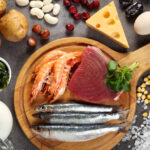Unlocking the power of iodine: 5 compelling reasons to prioritize your intake
 (NaturalHealth365) Have you ever wondered about the small, red bumps that occasionally appear on your skin or lips? These tiny yet conspicuous red circles are often cherry angiomas, and they could indicate an iodine deficiency – just one instance of how a lack of this trace mineral can adversely affect human health.
(NaturalHealth365) Have you ever wondered about the small, red bumps that occasionally appear on your skin or lips? These tiny yet conspicuous red circles are often cherry angiomas, and they could indicate an iodine deficiency – just one instance of how a lack of this trace mineral can adversely affect human health.
In fat, a recent study underscores that a balanced diet typically supplies adequate daily iodine, not exceeding 50% of the recommended intake. However, numerous individuals, particularly vegetarians, vegans, and others who do not regularly consume seafood or other iodine-rich foods, are vulnerable to various health issues.
Let’s delve into why ensuring you are getting enough iodine is crucial.
1. Thyroid health: A fundamental iodine connection
Iodine’s importance often flies under the radar, but it significantly enhances your overall well-being. Inadequate iodine intake can seriously impact the proper functioning of your thyroid gland.
The thyroid gland relies on iodine to synthesize hormones that play a pivotal role in regulating body temperature, maintaining heart health, supporting metabolism, and ensuring proper breathing.
2. Nurturing brain development
In addition to its role in thyroid health, iodine has a vital impact on brain development. It’s not just about preventing visible signs like cherry angiomas on the skin and lips; insufficient levels can lead to various issues, from reproductive and developmental disorders to metabolic complications.
Discover a Simple and Effective Way to Remove Toxins: This is Jonathan's #1 choice for at-home detoxification. Special offer ends Feb. 16.
Iodine’s significance begins during fetal development, where it plays an indispensable role in promoting brain development. Its influence remains crucial as the brain continues to evolve throughout childhood.
3. Preventing fibrocystic breasts
You may have heard the term “fibrocystic breasts” mentioned before, but chances are, you’re not entirely sure what it entails. Fibrocystic breast change is a non-cancerous condition that leads to the formation of uncomfortable lumps and tenderness in the breasts. Surprisingly, iodine deficiency can be a potential catalyst for this condition.
4. Nurturing cognitive development in childhood
Ensuring your child receives sufficient iodine is crucial, especially if they are picky eaters or have a limited diet. Inadequate intake can impact the development of their thinking and reasoning skills.
While sporadic iodine deficiency may not immediately manifest neurological effects, prolonged insufficient intake can affect ongoing brain development.
Children with a sustained moderate to severe iodine deficiency may experience diminished intelligence compared to those receiving an adequate supply of iodine. It’s a reminder of the vital role this trace mineral plays in nurturing cognitive development during childhood.
5. An essential component of your first aid kit
Few are aware that iodine possesses disinfectant properties. It serves as a valuable topical antiseptic in cases of injuries resulting in skin wounds.
Its applications extend to burns and minor cuts as well, as it effectively eliminates harmful bacteria while simultaneously preventing and treating infections, thereby expediting the healing process.
Incorporating more of this trace mineral in your diet
The amount of iodine your body requires hinges on your age and overall health. As per the National Institutes of Health (NIH), the recommended dietary allowance is 150 micrograms for both teenagers and adults, with pregnant women advised to consume 220 micrograms daily.
While seafood, such as oysters, can be a source of iodine, it’s important to note that many forms of seafood do have an increased risk of toxins like, heavy metals. Therefore, consider a mix of the following foods:
- Organic (100% grass fed) animal foods
- Sea vegetables like, nori, kombu and wakame
- High quality sea salt
- Organic, 100% pasture raised chicken
- Organic beef liver
- Organic, 100% pasture raised eggs
Moreover, organic dairy items such as raw yogurt, cheese, and milk are iodine-rich options to consider. If you’re allergic to fish, suffer from lactose, or follow a vegan or vegetarian diet, it might be beneficial to contemplate integrating a tincture or supplement into your daily regimen, but always consult with a holistic healthcare provider for personalized guidance.
Sources for this article include:



